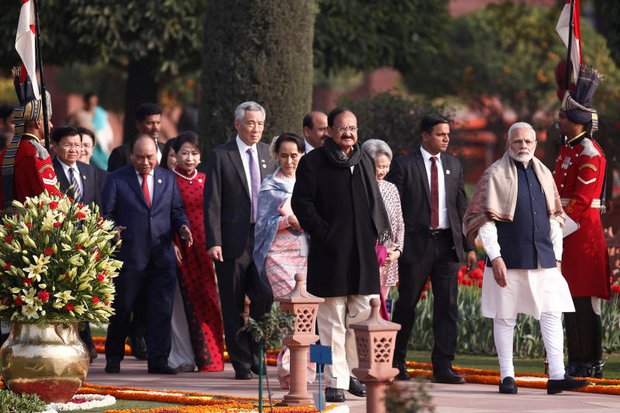
Even though US President Donald Trump repeatedly alluded to it in his speeches at Asean-led summits in Danang and Manila late last year, and despite its reference in both the United States National Security Strategy and National Defence Strategy, the geographic notion of a "free and open Indo-Pacific" (FOIP) straddling both the vast Pacific and Indian oceans has been given short shrift in many capitals. Chinese Foreign Minister Wang Yi suggested last March that the Indo-Pacific was only an "attention-grabbing idea", akin to "the sea foam in the Pacific and Indian Ocean" that "may get some attention but will soon dissipate". Asean leaders have paid some attention but have not had a collective and cohesive reaction to it. But now everyone in Asian security circles and beyond will take notice.
The bold and sudden renaming of the United States' "Pacific Command" into the "Indo-Pacific Command" will surely attract attention. The FOIP is now a living concept and a serious geostrategy to be reckoned with, peddled by a quadrilateral group of countries, led by Japan, in close partnership with Australia, India and the US. A new acronym in Asia's regional architecture and its contested regional order, the FOIP had its origins just over a decade ago when Japanese Prime Minister Abe invited India to join what was a trilateral strategic dialogue. The consequent "quad" is now seen as the FOIP's main driver, although the Indo-Pacific strategy is region-wide and multilateral, open to inclusion from other countries.

Thitinan Pongsudhirak teaches International Relations and directs the Institute of Security and International Studies at Chulalongkorn University.
It is early days for the Indo-Pacific as a competing framework for regional organisation. But its meanings and implications are already far-reaching for China, Asean and all parties involved in Asia's evolving future.
First, China will not be pleased with the US focus on the Indo-Pacific. Adding "Indo" to the US Pacific Command will likely rattle security planners in Beijing. Both India and the US are seen as rivals to China in different ways and in different theatres. For India, the arena of contest with China is largely confined to South Asia, particularly Pakistan, which is India's immediate security concern. For the US, geopolitical and geo-economic competition with China spans the two land masses on both sides of the Pacific.
Thus the US stations 375,000 civilian and military personnel at command headquarters in Hawaii. The Indo-Pacific command will likely see a gravitational shift to South Asia with closer cooperation with India. To Japan, this latest development in the US Indo-Pacific command will likely be taken as encouraging. The same goes for Australia.
Yet the key issue will be how China sees it. If China views the new front of the Quad-led offensive for regional order-making, Beijing may be provoked into pushing back. If so, we will see more tensions in the region. This happened in the past with the "pivot" and "rebalance" strategy of the previous US administration under President Barack Obama. China's takeover of the South China Sea broadly parallels the timeline of the Obama strategy in Asia, and the US at that time had no answer for it.
For Asean. China's perceived entitlements from history already include land reclamations and construction and "weaponisation" of artificial islands in the South China Sea, not far from Asean's maritime members, particularly the Philippines and Vietnam. Beijing now practically operates these artificial islands as forward military bases, recently solidified by a naval exercise revolving around the Liaoning, its only carrier strike group at this time, presided over by President Xi Jinping.
For mainland Southeast Asia, China has built upstream dams on the Mekong River at will to the detriment of downstream communities in Cambodia and Vietnam. As with the South China Sea, China offers its own rules around the Mekong via the Lancang-Mekong Cooperation, marginalising the long-established Mekong River Commission. And when President Trump pulled out of the Trans-Pacific Partnership, China became keener to move ahead with the RCEP as a regional free-trade platform which happens to exclude the United States.
Thus Asean is already overwhelmed by China. Now the FOIP poses multiple, different challenges. First, the major and middle powers in the Quad vis-a-vis China are likely to ratchet up geopolitical tension, especially if Beijing sees the Indo-Pacific as a provocative encirclement and containment. Asean's major rationale for existence has been to keep the major powers at bay and in balance, not to overwhelm and dominate Southeast Asia. This goal will be harder to achieve if the major powers ramp up their geostrategic confrontation.
Second, the US geographic expansion of its main military presence in the broad neighbourhood risks escalation. Lest we forget, the Trans-Pacific Partnership began life as a small foursome of cooperation among Brunei, Chile, New Zealand and Singapore. Eventually, when the US hopped on the TPP bandwagon, the trade-liberalisation vehicle took off and became finalised, although the Trump administration ironically withdrew from it in the end. If the US hops on the FOIP, it may similarly take off to the detriment of regional peace and stability in view of China's reaction.
Finally, the FOIP is a frontal challenge to Asean centrality. The four Quad members will insist that Asean is still front and centre of regional action and architecture building. But the FOIP has the potential to eclipse, overwhelm and bypass Asean by getting regional action done in ways that do not require Asean to be in the driver's seat at a time when Southeast Asia's 10-member grouping can find no answers for China's artificial islands and upstream dams, or even the Rakhine crisis in Myanmar.
Asean's leaders and bureaucrats will keep up their frequent meetings and comfort themselves that they remain relevant. But if the FOIP becomes more central and effective, Asean's regional star may dim. If that happens, it will be detrimental not just for Asean but also for the major powers, as there will no longer be the usual and reliable bridge and broker for regional peace and security.
